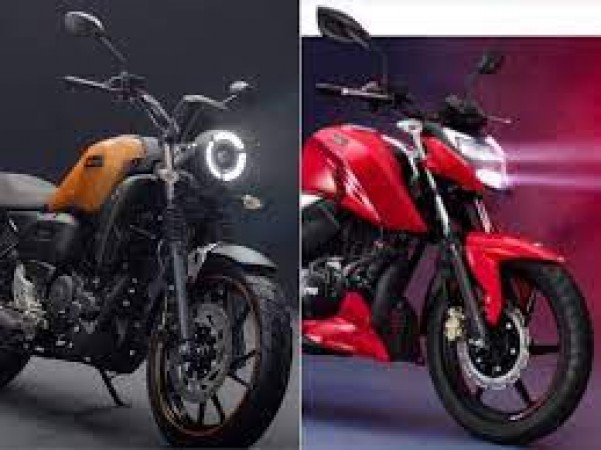
When it comes to choosing a 150cc bike, the market offers various options, each with its own set of features and advantages. Two prominent contenders in this segment are the Yamaha FZ and the TVS Apache RTR. Both bikes have garnered a substantial following due to their performance, design, and reliability. In this article, we will delve into the intricacies of both bikes, comparing their features, performance, and overall value for money.
The Yamaha FZ boasts a sporty and aggressive design that appeals to the younger generation. Its muscular stance, sharp lines, and LED headlamps contribute to its striking appearance, making it a head-turner on the roads.
Equipped with a refined 150cc engine, the Yamaha FZ delivers a balanced blend of power and efficiency. The engine's smooth performance across various RPM ranges ensures a comfortable and responsive ride, whether in city traffic or on open highways.
Yamaha has paid meticulous attention to rider comfort in the FZ series. The well-padded seat, ergonomically designed handlebars, and well-positioned footpegs contribute to a comfortable riding posture, reducing fatigue during longer rides.
The Yamaha FZ comes equipped with advanced features like a fully digital instrument cluster, single-channel ABS, and Yamaha's proprietary "Blue Core" technology. These features enhance the overall riding experience and safety quotient.
The TVS Apache RTR boasts a sleek and modern design language with aerodynamic elements. Its aggressive stance, sculpted tank, and race-inspired graphics give it a distinctive look that appeals to enthusiasts.
The TVS Apache RTR is known for its peppy performance, courtesy of its race-tuned engine. The bike's quick acceleration and impressive top speed provide an exhilarating riding experience, especially on open roads.
TVS has designed the Apache RTR with a focus on rider ergonomics. The well-contoured seat, clip-on handlebars, and rear-set footpegs create a sporty riding posture that suits both daily commutes and spirited rides.
The TVS Apache RTR incorporates cutting-edge technologies such as Glide Through Traffic (GTT) and adjustable suspension. These features enhance the bike's practicality and agility in urban traffic conditions.
Both bikes exhibit distinct design philosophies. While the Yamaha FZ exudes a bold and muscular look, the TVS Apache RTR exudes a sleek and dynamic aura.
In terms of engine displacement and power output, both bikes are closely matched. However, the Yamaha FZ's refined engine might offer a slight edge in terms of smoothness and refinement.
The TVS Apache RTR's race-inspired chassis and suspension setup contribute to its exceptional handling, making it an ideal choice for riders who prioritize agility and control.
While both bikes offer advanced features, the TVS Apache RTR's GTT technology provides an advantage in slow-moving traffic, enhancing convenience.
Both bikes offer impressive acceleration, with the TVS Apache RTR showcasing a more aggressive initial burst. In terms of top speed, they are again closely matched.
The Yamaha FZ's "Blue Core" technology focuses on fuel efficiency, giving it a slight edge in terms of mileage over the TVS Apache RTR.
The TVS Apache RTR's adjustable suspension allows riders to fine-tune their ride comfort. On the other hand, the Yamaha FZ offers a well-balanced suspension setup suitable for various riding conditions.
Both bikes perform admirably in city conditions, with the TVS Apache RTR's GTT technology offering an edge in stop-and-go traffic situations.
On highways, both bikes provide a stable and comfortable riding experience, allowing riders to cover long distances with ease.
The TVS Apache RTR's agile handling makes it a delight in corners, while the Yamaha FZ's balanced performance ensures confident maneuvers.
Both bikes are equipped with efficient braking systems, ensuring reliable stopping power. The presence of single-channel ABS adds an extra layer of safety.
The fully digital instrument clusters on both bikes provide a wealth of information, including gear position indicator, fuel efficiency data, and more.
Both bikes prioritize safety, with features like ABS and high-grip tires contributing to enhanced stability and control.
The TVS Apache RTR's GTT technology aids in slow-speed riding, while the Yamaha FZ's user-friendly controls enhance overall convenience.
Both bikes are competitively priced, offering value for money in the 150cc segment.
Yamaha's extensive service network and the TVS Apache RTR's reputation for reliability result in reasonable maintenance costs for both bikes.
Both Yamaha and TVS have a strong brand presence, contributing to favorable resale values for their respective bikes.
Owners of the Yamaha FZ praise its refined engine, comfortable riding position, and eye-catching design. Some mention its superior fuel efficiency as a standout feature.
TVS Apache RTR owners highlight its sporty performance, agile handling, and innovative features like GTT technology, which proves advantageous in congested traffic.
Evaluate whether you prefer a more aggressive riding stance (TVS Apache RTR) or a balanced and comfortable posture (Yamaha FZ).
Determine your priorities, be it city commuting, highway cruising, or occasional track days, to make an informed decision.
Take test rides of both bikes to gauge their comfort, performance, and features. This will help you choose the one that resonates with your preferences. In the battle of Yamaha FZ vs. TVS Apache RTR, both bikes exhibit impressive qualities that cater to different types of riders. The Yamaha FZ appeals to those who seek a refined ride, comfortable ergonomics, and modern technology, while the TVS Apache RTR attracts riders looking for sporty performance, agile handling, and innovative features. Ultimately, the choice boils down to your individual preferences and riding requirements.
Navigating the Legal Landscape: AI Misuse and Consequences
Revolutionizing the Road: Hyundai's Major Updates for 2024
Driving into the Future: Hyundai's Evolutionary Car Upgrades